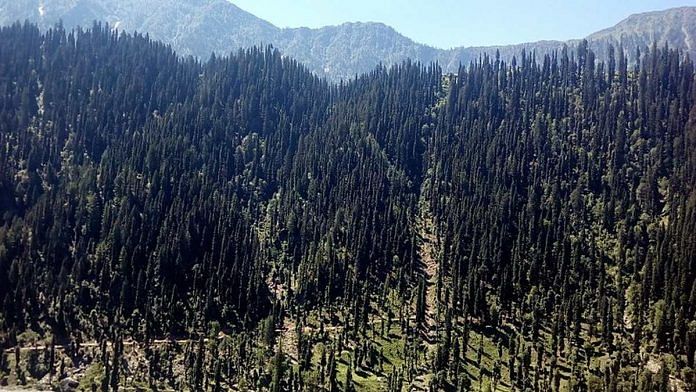Srinagar: The Jammu and Kashmir administration, which is in the midst of releasing names of individuals who have allegedly benefited from the now-scrapped Roshni Act, has now published the names of over 63,000 individuals, accusing them of illegally occupying more than 15,000 hectares of forest land.
The lists with names of the alleged encroachers were uploaded by the J&K forest department last week on its website. The department has divided J&K into 32 forest divisions, of which 12 are in Kashmir, while the rest are in Jammu.
This comes days after a political controversy erupted over the demolition of “illegal structures” built in a forest area. The demolition of the structures, which belonged to Gujjar and Bakerwal communities, had drawn severe criticism from regional political parties, which accused the government of uprooting local residents from their homes.
Meanwhile, sources in the administration said the authorities have retrieved more than 550 hectares of the 15,000 hectares of forest land this year alone.
“These encroachments have been done for over 70 years. The forest land illegally occupied by individuals has been retrieved over the years, but this year the process was sped up. This year alone, we have retrieved more than 550 hectares of forest land,” said a senior official, requesting anonymity.
“Under the Jammu and Kashmir Forest (Conservation) Act, we used to serve eviction notices to occupants under Section 48A and after the implementation of Indian Forest Act, which had to be implemented after the scrapping of Article 370, the notices are being served under Section 79A,” the official added.
Also read: Haseeb Drabu, NC, Congress leaders ‘gained’ from controversial Roshni land act — J&K govt
Jammu division with most cases
According to the lists, the highest area of forest land encroached upon is in Jammu region’s Ramban forest division (2,106 hectares), followed by Rajouri division (1,973.9 hectares), Poonch (1,472 hectares) and Shopian (1,026.77 hectares), which is in Kashmir division.
Around 655 hectares of forest land have been marked as encroached in Pir Panjal (Jammu), 579 in Nowshera (Jammu), 577 in Kashmir’s Kupwara and 499 in Jammu forest division in Jammu region.
A second senior administration official said there were around 200-250 court cases, challenging the eviction notices, adding that ongoing government checks are ongoing that could also settle some of the 63,000 cases.
“The issue is that revenue records do not have entries of forest land, so verification of the forest land is ongoing and it could be that some of the cases would be settled in the future, but for now the forest department, along with revenue and police departments, are vacating the lands,” said the official.
The trigger
The publishing of the lists is a result of a PIL filed in the J&K High Court by a Jammu-based non-governmental organisation, Save Animals Value Environment, in 2017.
According to its chairperson Rumpy Madaan, the NGO had been requesting the government for 100-kanal land (around 12 acres) to build a pond to take care of stray cattle.
“We had been asking the government to provide us land, which they did not. We filed a PIL in 2017 and the same year the court directed the forest department to provide land to the Jammu Municipal Corporation. However, that did not happen as officials kept on citing encroachment of land by people. Eventually, the court directed authorities to compile a list of encroached land,” said Madaan.
“Had we been given land for a cattle pond, this would have not even been revealed. I call this karma,” she added.
In compliance with the J&K High Court order of 19 September, the administration had constituted a committee of senior administration officers to take decisions on all complaints of encroached forest land and property received by it.
In a public notice published by the administration on 29 September, the committee stated that anybody willing to file complaints could approach them.
The publishing of the lists could, however, generate anxiety among the local residents and nomad communities dwelling in the forest areas.
Talib Hussain, chairman of the All Tribal Coordination Committee, said under the former state forest policy, forest dwellers and nomads were given a certificate known as ‘Matto’, which would entitle Gujjar and Bakerwal communities with grazing rights over the forest.
“We were also allowed to make temporary structures and use land for cultivation. But all that was over after the scrapping of Article 370. Now if khanabadosh (nomads) names are on the list, it will only increase our concerns. As it is, there are forces, who are propagating lies about Muslim communities grabbing land. If the eviction of so-called illegal occupants is selective, if the authorities only target Muslim community, we will know for sure that all this is a part of a communal agenda,” said Hussain.
Also read: J&K government to retrieve land transferred under Roshni Act within 6 months



